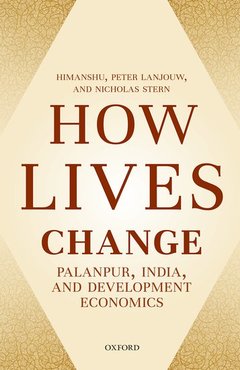Description
How Lives Change
Palanpur, India, and Development Economics
Authors: Himanshu , Lanjouw Peter, Stern Nicholas
Language: English
Subjects for How Lives Change:
70.09 €
In Print (Delivery period: 21 days).
Add to cart
Publication date: 08-2018
528 p. · 16.2x24.1 cm · Hardback
528 p. · 16.2x24.1 cm · Hardback
Description
/li>Biography
/li>
Development economics is about understanding how and why lives change. How Lives Change: Palanpur, India, and Development Economics studies a single village in a crucially important country to illuminate the drivers of these changes, why some people do better or worse than others, and what influences mobility and inequality. How Lives Change draws on seven decades of detailed data collection by a team of dedicated development economists to describe the evolution of Palanpur's economy, its society, and its politics. The emerging story of integration of the village economy with the outside world is placed against the backdrop of a rapidly transforming India and, in turn, helps to understand the transformation. It puts development economics into practice to assess its performance and potential in a unique and powerful way to show how the development of one village since India's independence can be set in the context of the entire country's story. How Lives Change sets out the role of, and scope for, public policy in shaping the lives of individuals. It describes how changes in Palanpur's economy since the late 1950s were initially driven by the advance of agriculture through land reforms, the expansion of irrigation and the introduction of "green revolution" technologies. Since the mid-1980s, newly emerging off-farm opportunities in nearby towns and outside agriculture became the key driver of growth and change, profoundly influencing poverty, income mobility, and inequality in Palanpur. Village institutions are shown to have evolved in subtle but clear ways over time, both shaping and being shaped by economic change. Individual entrepreneurship and initiative is found to play a critical role in driving and responding to the forces of change; and yet, against a backdrop of real economic growth and structural transformation, this book shows that human development outcomes have shown only weak progress and remain stubbornly resistant to change.
Himanshu is Associate Professor of Economics at the Centre for Economic Studies and Planning at Jawaharlal Nehru University,and Visiting Fellow, Centre de Sciences Humaines, New Delhi, India. His areas of research include issues related to poverty, inequality, employment, food security, and agrarian change. He has been involved with various government committees including the Expert Group on Measurement of Poverty (Tendulkar Committee), National Statistical Commission, and the Ministry of Rural Development. He has received the Sanjay Thakur Young Economist Award of the Indian Society of Labour Economics and Personnalité d'Avenir of the French Ministry of Foreign Affairs. Himanshu received his PhD in economics from JNU, New Delhi, India. Peter Lanjouw is a Professor of Development Economics at VU University, Amsterdam. Prior to joining VU University he spent more than two decades in the Development Economics Research Group of the World Bank, most recently as Manager of the Poverty and Inequality team. He is current editor of the World Bank Research Observer and a past assistant editor of the World Bank Economic Review. He is a fellow of the Tinbergen Institute and the European Development Research Network, and was a core member of the Global Poverty Commission. His principal research interests include the measurement and analysis of poverty and inequality in developing countries, structural transformation in developing countries, structural transformation in developing countries and the contribution of longitudinal village studies to the analysis of rural development. Nicholas Stern is the IG Patel Professor of Economics and Government, Chairman of the Grantham Research Institute on Climate Change and the Environment and Head of the India Observatory at the London School of Economics. He was previously President of the British Academy, and is President of the Royal Economic Society 2018/19. He was Chief Economist of the European Bank for Reconstruction and Developme
© 2024 LAVOISIER S.A.S.




